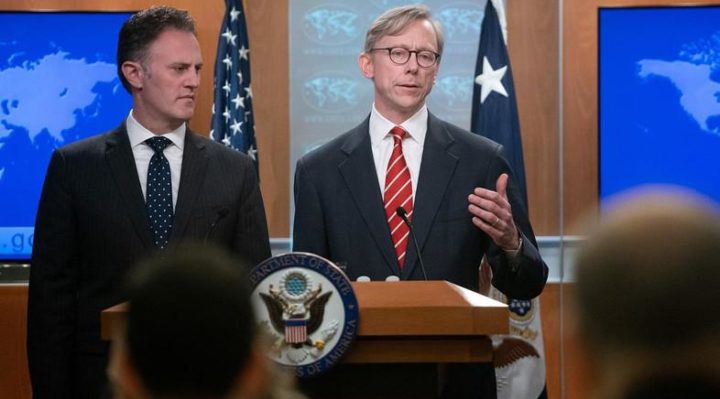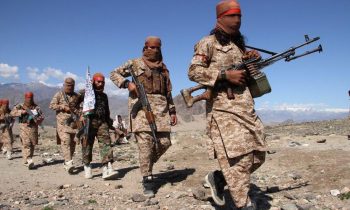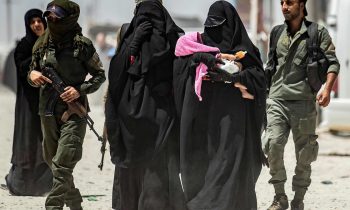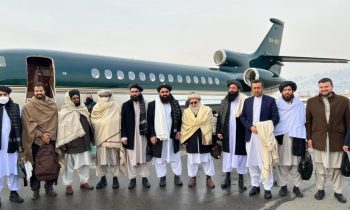US State Department officials said that the recent designation of the Iranian Revolutionary Guard Corps (IRGC) was designed to reduce the risk to lives of American soldiers or citizens by Iranian Gen. Qasem Soleimani in the future.
“General Soleimani has the blood of Americans on his hands, as does the force that he leads, and this designation that we took yesterday is another step to reduce the risk that any American soldier or any American will be killed by General Soleimani and the racket that he runs with the IRGC and the Quds Force,” Brian Hook, US Special Representative for Iran, told NORWAY NEWS during a telephonic press briefing along with the State Department’s counterterrorism coordinator, Nathan Sales.
US President Donald Trump designated Iran’s IRGC forces as a foreign terrorist organization on Monday. The designation comes into effect from April 15.
Comprising an estimated 125,000-strong military with army, navy and air units, the IRGC also command the Basij, a religious volunteer paramilitary group. It also oversees the Quds forces, commanded by Soleimani, who have fought Iran’s proxy wars in the region.
Hook referenced to recently declassified documents which said that Iran was responsible for killing over 600 US service members in Iraq from 2003 until 2011.
The US has in the past blacklisted dozens of entities and people for affiliations with the IRGC, but not the organization as a whole. In 2007, the US Treasury designated the IRGC’s Quds Force “for its support of terrorism,” and has described it as Iran’s “primary arm for executing its policy of supporting terrorist and insurgent groups.”
Asked on whether the US decision to designate the IRGC as a terrorist organization would increase the chances of a military conflict with Iran, Hook dismissed the concerns while adding that the sanctions’ primary focus was aimed at “driving up the costs of Tehran’s expansionist foreign policy.”
“There is no better path to support the Iranian people than to pressure the regime from outside and to drive up the costs of its internal repression and external terrorism,” Hook said.
Sales, the State Department’s counterterrorism coordinator, added that US sanctions have had immediate effects.
“Hezbollah used to receive $700 million a year to commit its terrorism from the Iranian regime. They’re now doing a fund-raising drive. That tells you something about the effects that our designations and sanctions tools have had,” Sales said.

Below is a full rush transcript of the press conference by Brian H. Hook, U.S. Special Representative for Iran also Senior Policy Advisor to Secretary of State and Ambassador at Large Nathan Sales, Coordinator for Counterterrorism
Mr.Brian Hook who is the Special Representative for Iran and Senior Policy Advisor to the U.S. Secretary of State and Ambassador at Large Nathan Sales, Coordinator for Counterterrorism at the Department of State.
Media: How would the U.S. designation of the IRGC affects its threat to its neighbors and its intervention in Syria, Yemen and Iraq? How would the U.S. designation as a terrorist group affect its threats to Gulf countries?
Ambassador Sales: There’s no question that Iran acting through its IRGC is a threat to those countries in the region. That’s one of the principal reasons why the Secretary has decided to designate the IRGC as a foreign terrorist organization. Doing so enables us to more aggressively cut off the flow of money into the IRGC’s coffers. Money that the IRGC would use to fund militias and terrorists in the region and around the world to cause violence and foment instability.
With yesterday’s announcement, we are taking a step to deprive the IRGC of the tools that it uses to pursue its malign agenda in the region.
SR Hook: I would say that, you asked about the Gulf countries, I think for our Sunni Arab partners in the region, this is a welcome designation because it will make it harder for the Iranian regime to execute its expansionist foreign policy. Just a week and a half ago in the New York Times, there was an article about how Iran’s proxies are under financial strain because of a combination of Iran mismanaging its economy and U.S. sanctions. And this action is another layer, the designation of the IRGC and the Quds Force as an FTO, that adds an additional layer of sanctions and it puts a lot of companies around the world on sort of heightened notice that doing business with the IRGC and providing material support to them has liability, both criminal liability, immigration consequences, and that we think that those measures are going to create powerful disincentives for individuals and companies around the world to avoid the IRGC.
That then has very positive consequences for our foreign policy because it just makes it harder for the IRGC to execute on its mission set. So this will be, we think this will be of help not only to America’s national security objectives, but it will also help our partners in the region.
Media: Why did you decide to designate the IRGC including its Quds Force as a foreign terrorist organization yesterday? Did these organizations change something over the last month?
Ambassador Sales: Well, it’s the next step in our pressure campaign. This administration has used terrorism and other sanctions for the past two and a half years to drive up the cost to Iran of its bid for regional power and its use of terrorism as a tool of statecraft around the world.
What happened yesterday was just the next logical step in our increasingly robust sanctions measures that we’re imposing on this regime to get it to stop its malign and outlaw behavior.
Media: Will this designation of the IRGC as a terrorist organization be similar in the U.S.’ previous approach to its designation of like al-Qaida and ISIS? How proactive will this decision be in terms of then targeting Qasem Soleimani, I mean the way Abu Bakr al-Baghdadi or Bin Laden were in the past perhaps? Is there any mechanisms within this designation that will apply to Soleimani in that way?
Ambassador Sales: Well this designation is all about financial impact, law enforcement impact, and immigration impact. What this designation allows us to do is increase the financial pressure on the IRGC and deprive it of resources. It enables our prosecutors to more effectively bring terrorism related cases against the IRGC supporters and enablers. It is now a federal criminal offense for any person to knowingly provide material support or resources to the IRGC. And third, there are immigration consequences to this designation. People who provide material support or resources to the IRGC will no longer be admissible to the United States. We’ll be able to keep them out of our country, stop them from coming here to raise money for the IRGC or to commit other malign acts while here in the United States.
SR Hook: We recently declassified numbers, about the number of American soldiers, it was 608 American soldiers who were killed by the Iranian regime and the IRGC during the Iraq War. General Soleimani has the blood of Americans on his hands, as does the force that he leads, and this designation that we took yesterday is another step to reduce the risk that any American soldier or any American will be killed by General Soleimani and the racket that he runs with the IRGC and the Quds Force.
Media: Could you clarify what consequences could foreign companies now face for having business with the IRGC?
Ambassador Sales: The Secretary of State yesterday was pretty clear about this. It’s now a lot riskier to do business with Iran. We know that the IRGC has permeated all aspects of the Iranian economy. It operates front companies around the world. It’s now a federal crime to provide material support to the IRGC. So any company that is considering doing business with Iran should take very seriously the risk that in so doing it will be providing material support to the IRGC and potentially incurring federal criminal liability.
The point of this designation, the effect of this designation is to render radioactive the IRGC and send a message to the rest of the world that doing business with Iran is harmful to your company’s financial health.
Media: How will the designation of the IRGC affect the relations between American authorities and American officials who will visit Lebanon, and the Lebanese government? Could American officials meet with the Lebanese government?
SR Hook: Congress, the statute, the FTS statute allows us to take the necessary designations that we need to to protect America’s national security interests while at the same time not impeding our diplomacy. We have now, I think since 1997, done almost 70 foreign terrorist organization designations, and that has had a range of organizations. At no point over these last many decades across many different administrations has this impeded our diplomacy. And we expect in the same way here, it will not impede any of our diplomatic efforts anywhere in the world.
But we do think that, I think you may have seen this just a few weeks ago, maybe it was almost a month ago, the leader of Lebanese Hezbollah for the first time in its history made a public appeal for donations, and that is a good thing, we think, for the people of Lebanon. We don’t think it’s in the interest of the Lebanese people to have this paramilitary organization that puts at risk the lives of the Lebanese people, prioritizes ideology over the welfare of innocent Lebanese people. And so we will continue to, Secretary Pompeo was recently in Lebanon, had very good meetings, gave an important speech there which I would refer you to that lays out our approach to Lebanon very clearly.
Media: Iranian officials have been mostly focused on threatening the U.S. military forces. Don’t you think this strategy, this designation, would increase any possibility of a military conflict?
SR Hook: No, we don’t believe that. When you look at the history of the regime, it has been chanting Death to America since its inception. They have, the IRGC is a terrorist organization. The IRGC, as I said earlier, has already killed over 600 American soldiers in Iraq alone. That doesn’t include Lebanon and other countries.
We are not going to have peace or stability or security in the Middle East without weakening the Revolutionary Guards, and that’s what our sanctions yesterday are designed to do.
We think that by stigmatizing the IRGC, exposing its operations for what they are, it has all the attributes of a terrorist organization. We think that this kind of approach and increased pressure will do more to save American lives and to make the middle East more peaceful and stable than essentially being extorted or blackmailed by Iran.
They have a long history of threats. They regularly threaten to close the Strait of Hormuz, they threaten and execute terrorism in Europe, Argentina, Asia, the Middle East. This is what they do for a living. It is identical to a deeply corrupt Mafia. If we were to guide our foreign policy on the basis of Iran’s threats of retaliation we would be playing by their rules, and that is a mistake I think many countries fall into. They fear taking action against Iran, the regime, because they fear Iran escalating. When you fall into that pattern you are playing by their rules, and when you play under the house rules, the house always wins.
We are, in this administration over the last two years have taken an entirely different approach to Iran. We are imposing historic levels of economic pressure on this regime to drive up the costs of their expansionist foreign policy, their violent foreign policy around the region. And we think that this approach is the best approach to both protect American soldiers, to protect Americans, to protect our partners in the region.
Media: What do you expect Europe or the European Union to do now after all the EU sticks to the Iran deal still?
SR Hook: On Europe, since the time we’ve gotten out of the deal, we have seen Europe take a number of steps to counter the range of non-nuclear threats that Iran presents to peace and security. So I think that we agree on more than we disagree with the Europeans. We obviously disagree about the Iran Nuclear Deal, but whenever we’re in a room with our European allies and we talk about Iran’s threats, the missile testing, ballistic missile testing, missile proliferation, the terrorism, terror finance, cyber attacks, maritime aggression, human rights abuses, the arbitrary detention of dual nationals, the oppression of women, we see eye to eye on this. There isn’t any disagreement. And I think Europe and our European allies understand that Iran has been able to leverage the Iran Nuclear Deal to expand its ballistic missile testing, and that’s because the Iran Nuclear Deal ended the prohibition on Iran’s ballistic missile testing.
They are in defiance of the Council when they do ballistic missile testing, but as part of the deal, Resolution 1929 was altered and it was succeeded by Resolution 2231 which diluted the ballistic missile testing prohibition, and we’re now dealing with the consequences of that with the increased space launches, ballistic missile testing, and then also just the missile proliferation.
So we are hopeful, especially after the Summary of Conclusions that Europe issued in January, the EU issued in January, that at some point we would love to see the EU match our designations on Iran’s, on the individuals and entities that are facilitating Iran’s missile program. We think it’s in Europe’s interest, it’s in our interest, certainly in the interest of the Middle East to do that.
With respect to the INSTEX, I think there is an understanding that that sort of vehicle is not going to be used to invade U.S. sanctions. We don’t see much corporate demand for this special purpose vehicle, this INSTEX because if you’re a European company and you’re given a choice between doing business in the enormous American market and the rather small Iranian market, it’s a very easy decision to make.
Let’s not forget that when you look at all of the trading partners of the European Union, the EU does more trade with Kazakhstan and Serbia than it does with Iran. It’s the 32nd largest trading partner. So I don’t want us to lose perspective on this. Iran is not a significant market for the EU. So I think in light of all this I think we have an agreement on the threats to peace and security that Iran presents; we disagree about the Iran Deal; we don’t see a lot of corporate demand for INSTEX.
Ambassador Sales: I just want to echo one of the things Brian just said. We agree with Europe more than we disagree on these issues. And one of the areas where we have a very strong common cause is on Iran-sponsored terrorism. We can all agree that the Iranian regime should not be using European soil to plot terrorist attacks, and we know that they are. We know that the IRGC and other elements of the Iranian government are active in directing assassinations and terrorism on the continent.
Just within the past several months we saw the foiling of an Iranian-backed plot to bomb a political rally outside of Paris. We saw the foiling of an Iran-backed plot to assassinate dissidents living in Denmark.
Set aside the nuclear deal. We don’t see completely eye to eye with our European friends on that, but we should all be able to agree, and we do agree that Iran-sponsored terrorism on the continent has to stop.
Media: Do you expect Iran regime will increase terrorist activities after this step was taken, will try to use some militias in third-world countries like Lebanon Hezbollah against Israel or try to use Saraya al-Ashtar against Bahrain or try to use another militia in Iraq to after this step was taken? Do you expect increased activities from Iran’s side?
Ambassador Sales: You can’t commit terrorism without resources, and that’s one of the principle reasons why the Trump administration has been so aggressive in using our sanctions authorities to cut off the flow of money and other resources to the IRGC, to the Iranian regime generally. And as Brian pointed out a moment ago, we’re seeing the effects.
Hezbollah used to receive $700 million a year to commit its terrorism from the Iranian regime. They’re now doing a fundraising drive. That tells you something about the effects that our designations and sanctions tools have had.
We can never anticipate with 100 percent clarity what a terror regime like Iran is going to do in response to yesterday’s announcement, but I can tell you that the threat of Iranian terrorism is precisely why we have put the IRGC on our FTO list because that enables us to marginalize that organization and deprive it of the resources that it otherwise might use to commit terrorist attacks in the region and around the world.
Media: What will happen to the countries that still deal with the IRGC after this decision? That is to say, what are the consequences in the case that some countries continue dealing with the IRGC and the militias that follow it?
Ambassador Sales: Well, we think countries have a choice to make. They can engage with Iran and take the consequences that follow, or they can engage with the United States and our allies and take the beneficial consequences that follow.
You look at all the countries in the Middle East where Iran is active, and they all have something in common. We’re talking about places like Syria and Yemen and Lebanon and in all those countries you see violence and instability, you see central governments that struggle to stand on their own two feet and represent the interests of their own people.
What Iran offers is submission, violence, bloodshed and instability. What the United States offers is sovereignty, prosperity, and the free and open exchange of commerce and people, ideas, et cetera.
So we think countries have a choice to make, and we think that when they do the cost/benefit calculus they’ll understand that doing business with the United States, engaging in friendly relations with the United States, is far better for them than being subservient to Tehran.
Media: My first question would be on a critique that have been levied against this decision by Jason Rezaian. He said that this designation would likely to entrench the power of hardliners in Iran. So he said that instead it would be better to target individuals that are responsible for particular action inside the IRGC. So he proposes this is a better strategy. So what would be your comment on this critique?
And a second very quick question, is there a relation for the fact that the this listing comes after the Islamic State has been finally defeated, a task to which arguably the IRGC has somehow contributed? Thank you very much.
SR Hook: I can take the first question. Jason is wrong. I think Jason’s position is exactly the position the Iranian regime would like people to take, and it’s what I was saying earlier. When you play by their rules, they win. And they have this narrative that they have perfected over 40 years of scaring people from exposing a corrupt religious Mafia and for taking stronger measures to isolate them diplomatically and economically.
There is no better path to support the Iranian people than to pressure the regime from outside and to drive up the costs of its internal repression and its external terrorism.
Ambassador Sales: And on the timing, let me just say the reason we announced it yesterday was because the announcement was ready yesterday. We’ve done a very robust and thorough interagency process that’s lasted quite a while to make sure that we are thinking through all the implications of the FTO designation of the IRGC. That process was completed in the very recent past, so we announced it when it was ready. Don’t read anything else into it.



